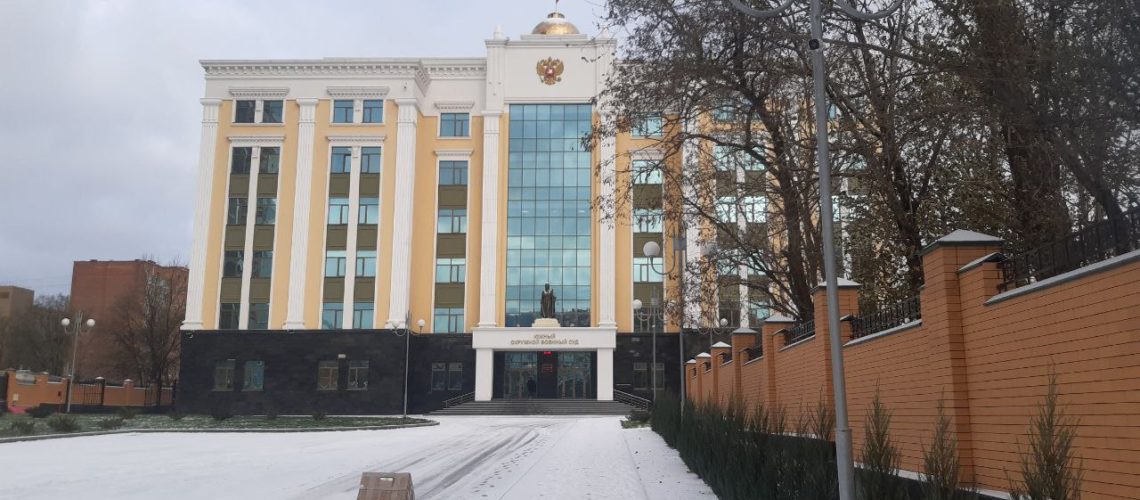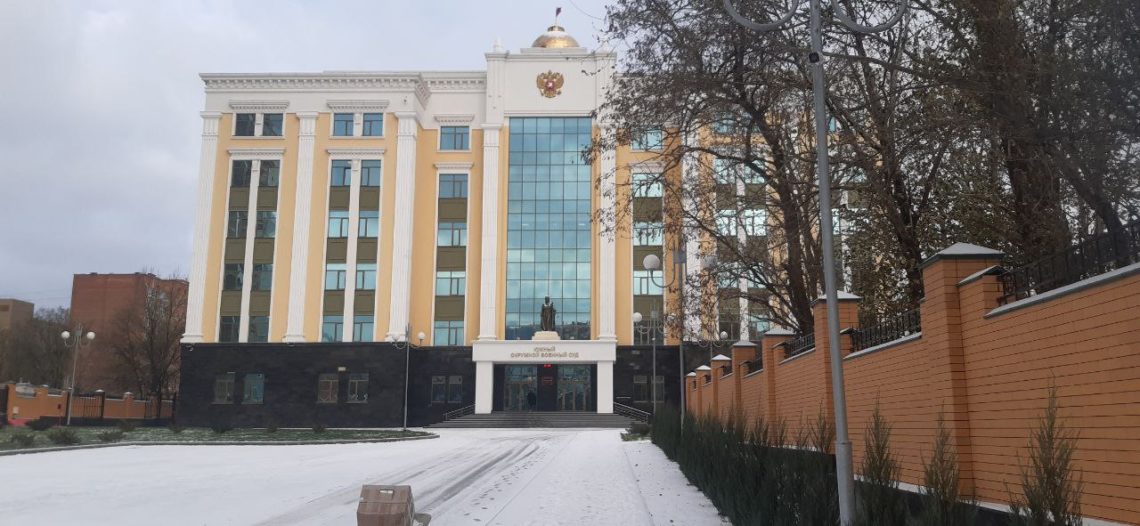

About the case: The case was initiated against 24 individuals from the “Azov” battalion (a terrorist organization forbidden in Russia [we are obligated by the Russian law to write this, ed. note]), nine of them being women, with two others exchanged before the start of the trial. The defendants are accused under Article 278 of the Criminal Code – violent seizure of power or violent retention of power, as well as Article 205.5 of the Criminal Code – organizing the activities of a terrorist organization and participating in the activities of such an organization. Several defendants are charged under Article 205.3 of the Criminal Code – training for terrorist activities.
The case is being considered by the three-judge panel, presided by Judge Vyacheslav Alexeevich Korsakov of the Southern Military District Court.
The presiding judge announced the presence of the participants. Some of the defense attorneys are absent, and the defendants who are left without defense attorneys will be defended by the attorneys present instead. No one objected to the continuation of the hearing in this composition.
The presiding judge announces that in the course of the presentation of evidence by the defense, the defendant Aleksey Smykov would be questioned. В.
Dubrovin (representing the interests of Gretzky, who was questioned at the previous hearing) asks for the opportunity to ask an “important clarifying question”. The court granted it. Attorney Dubrovin asks if Gretzky admits to receiving training for terrorist activities. Gretzky answers “no”.
Alexey Vladimirovich Smykov (rank: Operator of the operational brigade, senior soldier, non-commissioned officer, citizen of Ukraine) responds to the court’s question by stating that he is ready to testify. The presiding judge allowed the lawyer to ask questions. In the course of answering the lawyer’s questions, Smykov says that he entered the contract service in the 357th unit of the National Guard of the Ministry of Defense of Ukraine (Azov Regiment – an organization recognized as a terrorist organization on the territory of Russian) on 08.10.2018. Instead of military service, took a young fighter course and training in other areas, in 2019 participated in combat operations (on the Svetlodarsk Gorge), tattoos on the body are not associated with any ideology, did not participate in the shooting and torturing of civilians, interrogations lasted 8-10 hours without breaks.
Further questions are asked by the prosecutor. According to them, Smykov reports that he was captured, first conducted a rapid interrogation – about the positions of Ukrainian troops and available weapons, then interrogations with bias, the period of service – 08.10.2019 to 06.03.2022.
When asked by the court, Smykov said what weapons he had at his disposal during his service under the contract, that he had training before the contract.Smykov said that his duties included maintenance of weapons, preparation for their “work”, “work” (the prosecutor specified what is meant by “work” – firing), when asked about the targets “specifically what targets are fired at, I do not know, I only see numbers”, in no case there was any shooting at civilians, I have a normal attitude towards the inhabitants of the Donetsk People’s Republic as my fellow citizens, I did not know about the independence of the Donetsk People’s Republic, the photo with Hitler’s portrait is a joke, “I am neither a bandit nor a terrorist, I am a soldier”, “I have not committed any criminal acts against neighboring state”, during the investigation I was subjected to illegal methods of interrogation.
Smykov’s lawyer asks to attach the statement about illegal methods of investigation, the statement was submitted to the Investigative Committee of the Donetsk People’s Republic on 07.09.2023, and to request the materials of the inspection.
The court clarified whether anyone objected to the inclusion. There were no objections. The court decided to satisfy, to attach the application and the statement itself with an inventory.
The lawyer reads out a statement from which it follows that Smykov was constantly beaten after capture: after being taken captive, he was pistol-whipped on the head, forced to give an interview, was beaten by 5 people in the cell, broke several ribs, he was placed in a trauma center where he was treated for two weeks, after which there were interrogations for 8-10 hours, then he was forced to learn the Russian national anthem and perform with Putin’s portrait, when one of them was reciting the anthem, others were beaten in the torso area, his foot was broken, then he was in the basement with other people (about 350 people), he was also beaten there, then in the pre-trial detention center in Donetsk, he does not know who was beating him, they were wearing masks.
After the statement was read out, the prosecutor and defense lawyers asked several clarifying questions. In response, Smykov said that he joined the Azov regiment because it had better allowances, uniforms and level of training. In Mariupol, I showed the positions on the spot. All the courses that were in “Azov” are publicly available, this training does not differ from other training in the AFU.
Before reading Smykov’s testimony, the presiding judge recalled that he had not allowed the motion regarding the reclamation of inspection materials. He decided to grant it and to demand the investigation materials on the claim of unauthorized methods of investigation.
Smykov’s lawyer asked to make public a part of the examination about ideological inclinations. The court granted it. It follows from the expertise that no fascist, chauvinist and ideological nationalist orientation was revealed in Smykova’s actions, his actions were guided by material needs and the desire to establish himself in the collective.
The prosecutor made a motion to disclose the interrogation records and on-the-spot testimony during the investigation. Smykov’s counsel objects to the disclosure of the interrogation of 18.03.2022, as it was conducted without a lawyer. The defendant supports the position of the lawyer.
The court decided to grant the motion, i.e. to read out the minutes of 18.03.2022.
The prosecutor read out the protocol, which first explains the right to defense, and then Smykov waives the right to defense counsel. Next the prosecutor starts to read out the interrogation record of 18.03.2022, but is suddenly stopped by the presiding judge.
It turned out that there was a new lawyer in the hearing in the interests of Mogitich, the judge announced to him the composition of the court, the prosecutor explained the right to challenge. There were no challenges. Presiding judge states that the lawyer has entered and attaches her motion to familiarize herself with the materials.
Then the prosecutor continues to read out the protocol, which outlines the circumstances of the contract, service and surrender, then the prosecutor also reads two more interrogation records, in which Smykov partially admits his guilt, with the reservation that “he did not seize power, did not influence the constitutional order”, repents, confirms the previously given testimony, as well as the protocol of reproduction of the circumstances on the spot.
After the reading, the lawyer asks Smykov to explain the circumstances under which he waived counsel.. Smykov says that he waived counsel and signed the protocol because he was forced to do so. The lawyer was not present at the interrogations, she came only at the end, signed what was ready, “she was more interested in her dogs than in me, she left to feed them“. According to the circumstances stated in the protocol, Smykov says that “everything was twisted”.
Smykov’s lawyer draws the court’s attention to the end time of one of the protocols, it is earlier than the start time.
Smykov’s lawyer, other lawyers and the prosecutor then ask a number of clarifying questions about the disclosed materials.
The presiding judge has already set the date and time of the next hearing, but the prosecutor asks to consider his request to extend the preventive measure (the current measure is until December 29) for three months, until March 29, 2024. He read the prepared text summarizing the request for extension for all 22 defendants.
The defendants partly opposed the satisfaction, partly left it to the discretion of the court, the defense attorneys supported the positions of their clients.
The court retired to the deliberation room and upon its return, extended the detention.
© 2019-2021 Independent public portal on impartial trial monitoring
